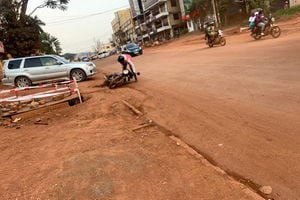
Benjamin Rukwengye
My boda guy told me this week that he had sent his wife to the village to give birth. “Why, yet the best hospitals are here in Kampala?” I asked, a little puzzled. “Kampala hospitals are unmanageable,” he responded.
I was probably approaching this conversation from a position of ignorance – because of my privilege. But you would think that access to the best healthcare would be the priority in such situations – even if I understand that quality in this case is very relative.
Childbirth is a matter of life and death, and the odds are worse depending on how far you are from the centre. I was tempted to ask what would happen if something were to go wrong but I couldn’t bring myself to. Instead, when we got home, I offered him a small contribution and wished them the best of luck.
Uganda is a confounding country. Every sector has seen considerable and undeniable progress in the last 10 to 15 years. Yet, it is hard to tell whether things have gotten better in granular terms. As this column has argued in the past, there aren’t many people who would birth their children in the hospitals where they were born or take them to the same schools they went to – because they aren’t up to scratch.
Healthcare has gotten a lot more expensive even as the number of providers – private and public – is unprecedented. The quality however is the kind that everybody complains about so it is safe to say that it hasn’t improved.
That is why stories like the one of my boda guy are peculiar but unsurprising. As access has increased but without quality, people have defaulted to what is familiar. If your wife is going to give birth, you need a medic who you can trust. Someone you know – especially if you are a poor boda boda rider.
If you are a hapless boda rider, that person will likely be in your village, running a joke of a health centre, and probably unlicensed to practice. But that is who you know and better to deal with them than count on the sharks in Kampala’s hospitals and health centres. But also, it dawns on you that the money you risk your life for isn’t enough to keep a new one alive, so you need the help of your folks and ancestors if they are going to stand a chance.
It may not look like it but the situation isn’t so different with the education sector. We have more schools yet we complain about the quality of learning. The evidence is that the fortunes and outcomes of those who complete or drop out aren’t too dissimilar. They are all likely to end up running errands at Nasser Road, riding bodas, repairing phones in Mutaasa Kafeero Plaza, doing this and that in the UAE, or wherever Uganda’s thriving informal sector places them. But everybody knows that this wasn’t always the fate of the products of Uganda’s education system.
In broader terms, this situation is also an extrapolation of the breakdown of systems and how they have been replaced by clientelism and patronage. We have gotten to a point where it is more important to know or be known by someone than it is to have money. It doesn’t always matter whether you are on the right or wrong side of the law. You always need someone in security, politics, church, judiciary – and hope that whoever is on the other side doesn’t have a contact that can countermand yours.
And that’s the complexity in which many Ugandans find themselves. You are more likely to get punished for following logic and due process and rewarded for doing the illogical and finding shortcuts. When you are a boda rider who has seen your leaders choose to go and die abroad or heard stories about how their kids are in Europe and the US, you start to listen to their statistics about new hospitals and schools with half the attention that a street preacher might get.
So, today when you see a boda guy behaving irrationally, it might help to tell yourself that he probably has a better understanding of Uganda and how to survive in it than you do. Give him and his hustle some respect. For all of us, the goal is to survive because only a handful can thrive.
Mr Rukwengye is the founder, Boundless Minds.
@Rukwengye




